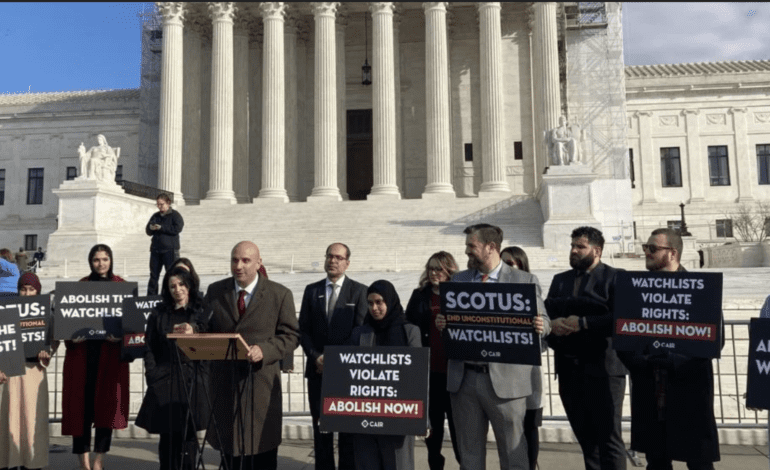WASHINGTON, D.C. – On Tuesday, the U.S. Supreme Court ruled that Yonas Fikre’s challenge to his previous placement on the No Fly List can proceed, rejecting the government’s claim that his removal from the list rendered the lawsuit void.
Fikre is an Arab and Muslim American initially from Sudan, who was tortured and imprisoned in the United Arab Emirates at the behest of American officials, and then stranded in Sweden because of his status on the No Fly List, after he refused pressure from the FBI to become an informant.
The government took Fikre off the list after CAIR filed suit and tried to argue that his case was moot in order to avoid the threat of a court ruling declaring the Watch List unconstitutional. The FBI had previously removed more than 10 CAIR clients from the No Fly List in response to lawsuits filed by the civil rights group.
The U.S. Supreme Court unanimously decided that the government failed to demonstrate the case was moot, finding it was possible the government could place an individual on the list again. Citing the doctrine of voluntary cessation, the Court stated a case could be found moot if the defendant showed the practice could not “reasonably be expected to recur.” Justice Neil Gorsuch, who wrote the majority opinion, stated that the government “[fell] short of demonstrating it cannot reasonably be expected to do again in the future what it is alleged to have done in the past.”

Yonas Fikre (left), pictured here in February 2015, talking to media with his attorney, Thomas Nelson, in Stockholm, Sweden about his inability to return to the United States because of his placement on a U.S. government no-fly list. – AP file photo
Fikre, a U.S. citizen who lived in Sudan, sued the FBI in 2013 after being placed on the No Fly List. He claimed his placement on the list violated his right to due process and was discriminatory on the grounds of race, national origin and religion. He moved to Sudan from Oregon in 2009 to build his business and claimed the FBI placed him on the list after he refused to become a government informant. When he moved back to Oregon in 2015, the government removed him from the list a year later, arguing the removal rendered the lawsuit moot.
The government relied on an FBI declaration that stated Fikre “will not be placed on the No Fly List in the future based on the currently available information.” The U.S. Court of Appeals for the Ninth Circuit reversed the lower court’s decision that found for the government, finding the declaration did not disclose what conduct placed Fikre on the list and did not ensure he would not be placed on the list again if he were to engage in that same conduct in the future. The Supreme Court, which granted certiorari in October, agreed.
CAIR: Supreme Court decision in Watch List case a “Historic milestone for American Muslims”
“What matters is not whether a defendant repudiates its past actions, but what repudiation can prove about its future conduct,” Gorsuch said. “It is on that consideration alone – the potential for a defendant’s future conduct – that we rest our judgment.”
The No Fly List is a part of the U.S. government’s terrorism watchlist that prohibits known or suspected terrorists from flying into, out of, within or over the U.S. The American Civil Liberties Union (ACLU), which filed an amicus curiae brief on Fikre’s behalf, found that more than 81,000 individuals had been placed on the list by 2016. Most details about the list are not available to the public, including the reasoning for an individual’s placement on it, and the government argued that allowing cases like Fikre’s to proceed would force it to reveal such classified information. The ACLU, however, stated that “people wrongly placed on the list are stigmatized as terrorism suspects and denied a fair process to clear their names.”

CAIR National Deputy Litigation Director Gadeir Abbas, who argued the case for Yonas Fikre before the Supreme Court on January 8, speaks to the media in front of the Supreme Court in Washington, D.C. To his right is CAIR National Litigation Director Lena Masri and behind him is CAIR National Executive Director Nihad Awad, surrounded by supporters. —Photo courtesy of CAIR
“For decades, rights groups have documented the secrecy and unfairness of the No Fly List program and its devastating consequences for people’s lives, yet the program has remained a black box,” ACLU National Security Project Director Hina Shamsi said. “Not only are people left in the dark about why they’ve been placed on the list, they are not given any meaningful explanation when they are removed, or any guarantee against being wrongfully placed on the list in the future.”
CAIR National Executive Director Nihad Awad lauded the decision.
“CAIR has achieved a major victory at the Supreme Court and a historic milestone for American Muslims, including tens of thousands unjustly targeted by our government,” he said. “We vow to continue our fight until the FBI’s secret Watch Lists no longer target our communities and undermine the Constitution. We congratulate our amazing legal team for this achievement, and we thank our supporters for entrusting CAIR to protect their rights.”
“The Court’s unanimous decision is a stinging rebuke of the FBI’s longstanding practice of avoiding accountability by removing innocent Muslims who challenge their listing in federal court,” CAIR National Litigation Director Lena Masri said.
The list began expanding rapidly after the terrorist attacks of September 11, 2001, prompting concerns over discrimination. According to the ACLU and other Muslim and Arab American civil rights organizations, Americans on the list are “disproportionately Muslim and those of Arab, Middle Eastern or South Eastern heritage.” Fikre’s attorney Gadeir Abbas expressed concern over such discrimination.
“The FBI cannot play whack-a-mole with the rights of Muslims,” he said. “The FBI cannot place innocent Muslims on the No Fly List, only to then block that unconstitutional list from scrutiny by removing those Muslims whenever they file a lawsuit.”
The Supreme Court’s ruling on Tuesday merely permits Fikre to proceed with litigation and Gorsuch emphasized that the government may be able to demonstrate Fikre’s placement on the list did not violate his constitutional rights. The decision, however, is seen as a victory for those who criticize the No Fly List as being overly inclusive.
“In case after case, we’ve seen the government remove people from the No Fly List and prevent their legal challenges from being heard with no guarantee that the government will not wrongly place them on the List again,” Shamsi said. “With this decision, the Supreme Court has ensured that an American challenging his No Fly List placement is actually given his day in court and we are delighted for Mr. Fikre.”






Leave a Reply